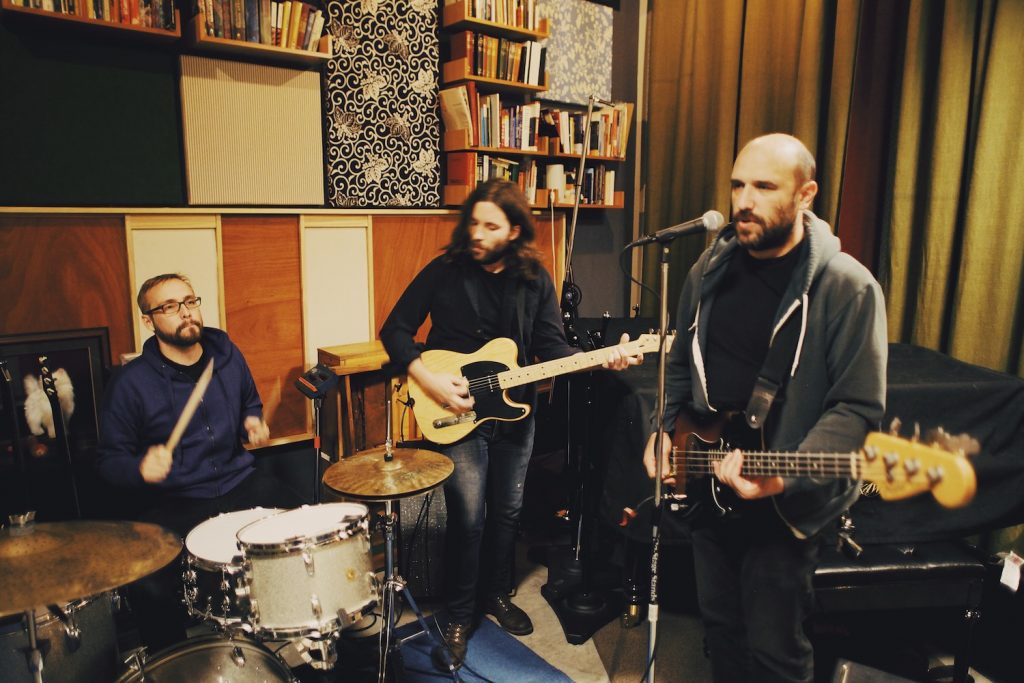
Much of David Bazan’s music over the past two decades has fixated on the many ways in which we ache, the ways we deal with the pain we feel we can do nothing about. Pedro The Lion’s 2002 record Control lingered on the fiery ache of infidelity and moral rot. Bazan’s 2009 solo album Curse Your Branches dealt with the pain of losing faith and gaining responsibilities. Phoenix, Bazan’s first LP under the Pedro The Lion name in 15 years, falls in line with this observation, dealing with the dull, sometimes yearning and sometimes regretful ache of nostalgia.
Pedro The Lion’s return comes in the form of a rumination on Bazan’s first hometown and the years he spent growing up there. Phoenix is baked in the harsh sunlight of the Arizona city it’s named after, perfectly encapsulating the strange, melancholy fondness of childhood memories. On “Yellow Bike,” the first proper song on the record, Bazan speaks from the perspective of his six-year-old self on the day he received his first bicycle. The sheer excitement and the overwhelming possibility of the scene gives a simple memory all of the grave importance that a child might feel in this situation, a kid in complete control for the very first time: “First freedom, second life/All the places I could ride.” Later on, “Quietest Friend” recounts the young Bazan’s complicity in bullying another child with such remorse that it could’ve happened yesterday. The song jams through heavy, thick guitars as Bazan mines that regret, showing how it ripples into the way his older self interacts with the world:
“We could write me some reminders/I’d memorize them/I could sing them to myself/And whoever’s listening/I could put them on a record/About my hometown/Sitting here with pen and paper/I’m listening now”
Adopting such a young perspective can often be a minefield of clichés and low stakes, but Bazan approaches his younger self and his past life with such empathy and conviction that it consistently pays off. “Circle K” is a legitimately mournful song about Bazan blowing all his pocket money on candy. On the flip side, “Clean Up” is a bright, upbeat track with the cadence of a kindergarten sing-along that turns the idea of tidying up your room into a mantra for taking care of your brain. Bazan succeeds in this sleight of hand over and over.
Phoenix plays out like a collection of related short stories—each one stands on its own, but together the 13 tracks provide a larger, richer portrait of the same world. The schoolyard tales of tracks like “Yellow Bike” are balanced with songs like “Black Canyon,” a song about a Phoenix man who took his own life by jumping in front of an oncoming truck. It’s a story heard secondhand, and Bazan focuses on the humanity of the scene, a paramedic losing her composure for just a moment of pure empathy (“She gathered herself and crept back to the truck/Remembering all of the times she’d nearly given up”).
The climax of the record, “My Phoenix,” is the fiercest rock song on the album. The song gives weight to the complex ache of nostalgia, as Bazan takes a look at his hometown broadly and articulates the ways in which a place with such deep roots in his life can fail him: “From a disappointed son/To the city that he loves/The flags you wave around have got me wondering/If my Phoenix still shines?” It’s not easy to look critically at a remnant of a past life, but purposefully obscuring the bad parts does more harm than good.
In the final movement of closer “Leaving The Valley,” Bazan namechecks a number of signifiers of his hometown and his childhood, from streets like Dunlap to symbols like the cactus. These are details without clear stories, but the way Bazan sings them, with such care, is like each one is a page in an old photo album. It’s the final symbol, the crossroads of Union Hill and 35th Avenue (which someone has already figured out is the location of Bazan’s vice, the Circle K), that carries the most weight, Bazan repeating the line with more conviction, more strange longing, his voice breaking just ever so slightly on the “Avenue” as the song reaches its conclusion. As Bazan returns to his past in more ways than one in Pedro The Lion’s first record in a decade and a half, the ache of his nostalgia reveals a small, universal truth: You can always return to your past, but it will never be quite the same. Bazan is comfortable with this truth on Phoenix, and it makes for one of the best albums of his career.
—Jordan Walsh






